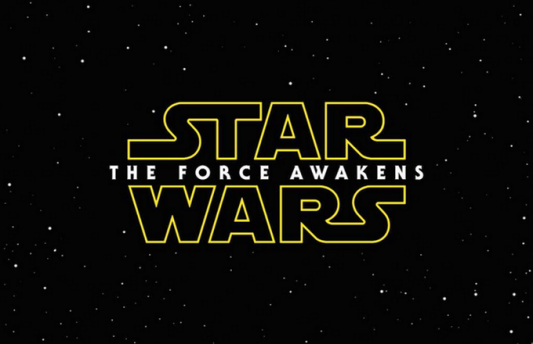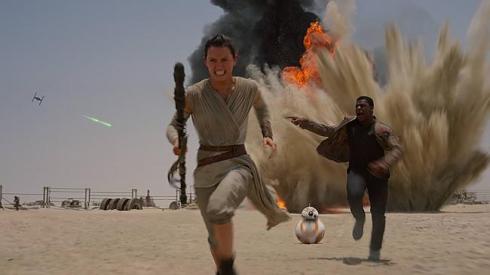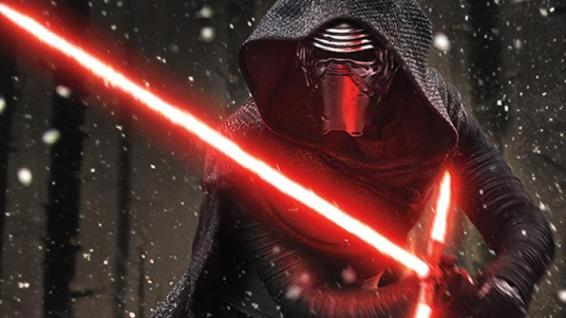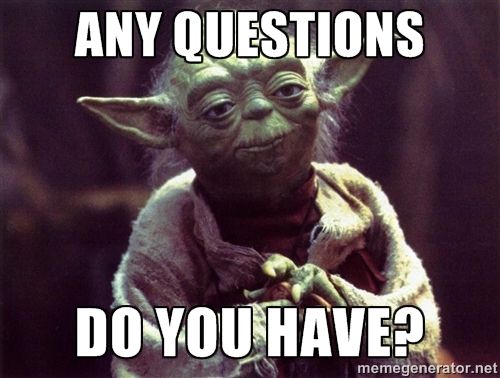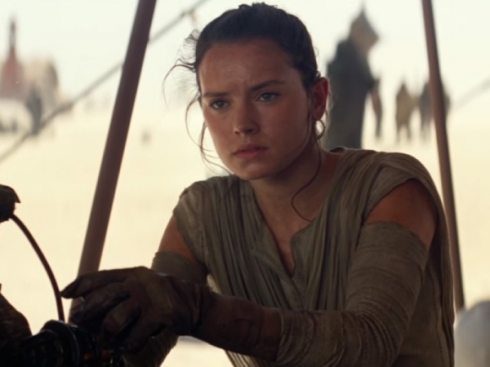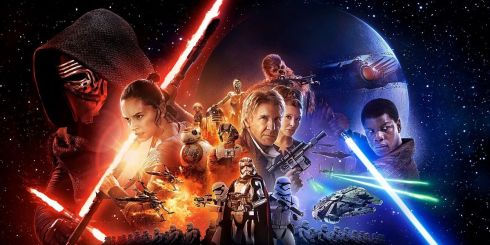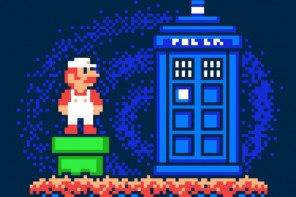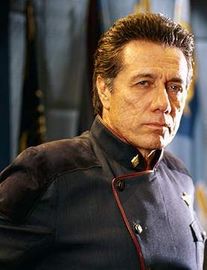In honor of the late, great Alan Rickman, I watched Galaxy Quest again the other night. In my mind, I know that it’s a fantastic movie, but seeing it again always surprises me at just how good it is. Not only is it infinitely quotable on the order of Big Trouble in Little China or The Princess Bride but I think it’s one of the greatest Star Trek movies ever made.
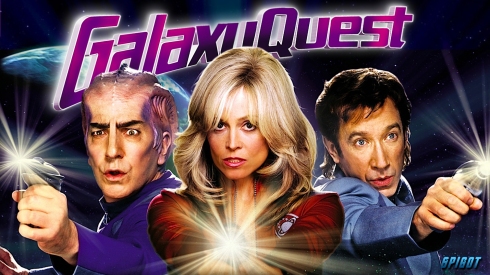
Ooooooooh Yeeeeeaaaaaahhh! *said in a Kool-Aid Man voice.
No really, I love it in many ways as much as Star Trek II: The Wrath of Khan, and for those who may not know me, let me tell you that’s saying something. The bagpipes at Spock’s funeral and Kirk’s voice catching when he says “His was the most…human” still bring tears to my eyes. True story.
So why do I love Galaxy Quest so much? Good question, I’m glad you asked. Here’s the rundown of my top 3 reasons:
#3 It Understood Star Trek Better Than Star Trek Did:
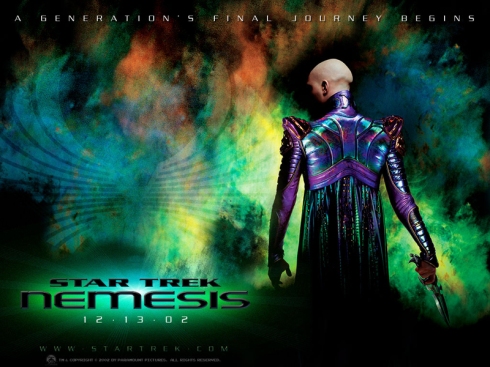
Nope.
Galaxy Quest arrived right between the rather ‘meh’ offering of Star Trek: Insurrection and the soul-numbing death knell of the TNG movies, Nemesis. The Next Gen movies were often a bitter pill for Trek fans back then. Yeah, First Contact was quite good, and certainly the best of the bunch, but I never cared for the idea of a Borg Queen, or at-will time travel (again), or their portrayal of Zefram Cochrane. But I digress…ahem.
In truth, Galaxy Quest seemed to have a better understanding of Star Trek and its fans FAR and away better than the people who were in charge of the actual franchise at the time. From the fans who seem painfully familiar on the convention floor, to the tropes of the Original Series (and straight through the chompers…), all of these things told me that it was a parody made with utmost love for the source material. The elevator scene where the actors see the NCES Protector in space dock, glowing like an angel, could have been the Enterprise clearing its moorings to the sweep of a James Horner score.
Dean Parisot, David Howard, and Robert Gordon knew what we wanted to see in a Star Trek movie, and in so doing, gave us a parody that was better than the thing it was imitating. You know, like a cinematic Weird Al Yankovic.
#2 Brandon & Quellek:
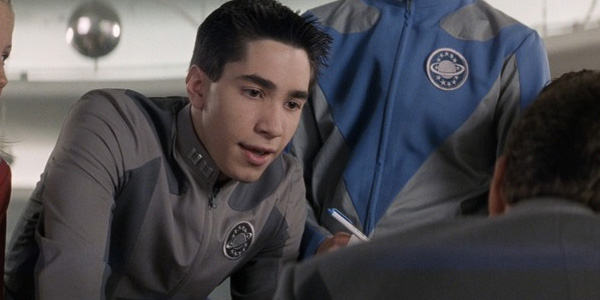
Yeah, I was totally this guy.
There are two characters that deeply capture what it means to be a Trek fan (no, I’m not using ‘Trekkie’ or ‘Trekker’ here. Debate the usage elsewhere, please). The first is Brandon, the nerdy teenager played by Justin Long. He totally echoes my 15-year-old self who dreamed that my incredible Trek nerdiness and knowledge of the official tech manuals might one day come in useful when William Shatner or Patrick Stewart showed up and needed my help. When Brandon exclaims, “I knew it!” it speaks to the hope that somewhere, out in the vastness of space, the Enterprise is a real ship, a real place you can go, and not just a TV set made of wood and Christmas lights.
The other is Quellek, the Thermian who idolizes Dr. Lazarus. Ask yourself this: How many real-life scientists were inspired by Leonard Nimoy’s Spock? A great deal, I’m sure. The characters that actors portray can mean something to us deep down. Really mean something. They can inspire us in ways the actor may have never imagined. Quellek says, “Even though we had never before met, I always considered you as a father to me.” That really sums up the actor-fan relationship, especially for that one character that really speaks to you. Galaxy Quest understood that, embraced it, and made it part of the story.
#1 Alan Rickman:
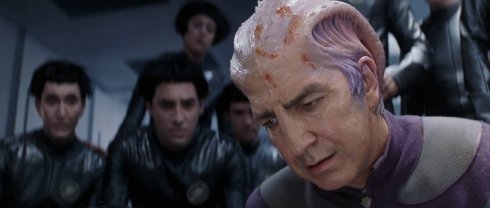
😥
The cast of this movie (including the Queen of Sci-fi herself, Sigourney Weaver) really shines, no doubt about it. Alan Rickman, however, is off the chain as Sir Alexander Dane/Dr. Lazarus. For an actor so celebrated for his villainous roles, it’s refreshing to see his comedic side as an actor who feels trapped by the role of Dr. Lazarus, and constantly upstaged by his rival, Jason Nesbitt.
But as funny as he is, it’s during those serious moments in the film that Rickman really brings it all home. Going back to Quellek’s death, we see that Alexander, who has never liked his character’s oft-repeated tagline, says “By Grapthar’s Hammer, by the Sons of Warvan, you shall be avenged.” And we know that he means it thanks to Rickman’s masterful dramatic delivery. I think this is the most powerful scene in the movie. It gives the movie, which is mostly parody, a dose of real gravity. It would be like getting a full-on “Live Long and Prosper” from Leonard Nimoy if we thought he was, in fact, Spock. Oh, the feels. THE. FEELS.
Conclusion:
This movie has a special place in my heart, not only because of the reasons I listed above, but because as a whole, it just works. To me, it’s about hard reality intruding on fantasy, which makes watching it bittersweet since Alan Rickman is now gone, along with his character’s real-life analogue, Leonard Nimoy.
You know, writing that last sentence, putting it into words, really hurt.
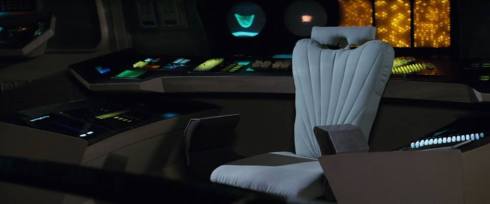
“…”
Being a Star Trek fan is in my blood. I was blessed to grow up with two parents who both liked the Original Series, and embraced Next Gen immediately when it came around. I went to Star Trek conventions when it was actively uncool to do so, but I met a lot of my fellow fans. For a kid who was incredibly shy and introverted, it was such a relief to strike up a conversation with a total stranger on the convention floor just because we both loved something.
The fans are, and shall always be, one of the greatest things about Star Trek. That is what Galaxy Quest included that other actual Star Trek films just can’t. This is why a parody like this rates right up there with Wrath of Khan. It taught me that if you truly love something you should…
…say it with me…
Never give up! Never surrender!
